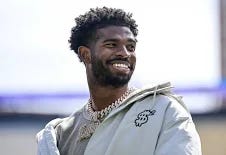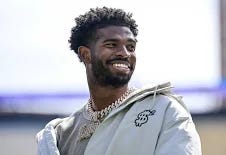Years ago, I met Venus and Serena’s father, Richard Williams, at the La Costa Resort and Spa. He was completely gracious, carrying a strong sense of self and a clear purpose for his daughters. Some admired it; others resented it. But whatever people thought, it’s undeniable: he did well by them.
Deion Sanders is cut from the same cloth, at least in the sense that he has a purpose for his sons. But if the reports about Shedeur Sanders' pre-draft interviews are true, he engineered his own fall.
That’s the difference between Richard and Deion.
Richard understood the game—and played it masterfully.
Deion knows the game too, but he made one critical mistake: he was such a great player that teams had no choice but to put up with his brashness and cockiness. Somehow, if the reportage is accurate, Shedeur assumed that same latitude applied to him.
The good news is Shedeur now gets the chance to prove everyone wrong. I believe he’s capable. But he landed with an awful team—one with no history of developing quarterbacks. If he succeeds in Cleveland, it will be because he is great, not because of the system around him.
Let me add the Mannings and the Elways to the mix.
The differences between the Elways, the Mannings, the Williamses, and the Sanderses are more than superficial.
John Elway faced enormous backlash for refusing to play for the Colts, leveraging the threat of a pro baseball career to force a trade. Richard Williams endured loud public scorn for charting his daughters’ own path outside of traditional tennis development.
The backlash against the Mannings, however, was more muted—not because they were white, but because Archie Manning had earned immense public sympathy. Fans watched Archie take horrendous shot after horrendous shot for the worst team in football year after year. People could rationalize a father not wanting his son to suffer the same fate.
The Elways used leverage.
The Mannings had sympathy.
Richard Williams bore contempt until the world could no longer deny the reality of Venus and Serena.
Deion Sanders is different. He drives people crazy—not just because he talked, but because he backed it up. Consistently. In both baseball and football. He won, and he still wins. But the hatred people have for Deion has now been transferred to Shedeur.
As I have said before: NFL teams have no moral scruples. They will hire rapists, murderers, woman-beaters, thieves, drug dealers, and dope heads—if you have talent and can help them win.
Shedeur Sanders is not in that category.
He is a first- or second-round talent, not a fifth-rounder.
The simplest explanation for his fall is not racial.
The NFL does not care about your color or your character. It cares about one thing: control.
The best way to understand it is in a moment captured during this year’s draft.
A Detroit Lions draftee, overwhelmed by emotion, wept and told the head coach:
"I would die for you."
I’m sure it was raw emotion—but it perfectly captures what NFL executives want: players who will surrender their destiny to the team’s desires.
Those words would never come out of Shedeur Sanders’ mouth.
And because of that, no NFL team was willing to entrust the future of a multi-billion-dollar franchise to him.
He dared to show them—either by word or demeanor—that his destiny was not for sale.
That is why he went in the fifth round.
The system loves winners.
The system forgives sinners.
But the system hates independent men.
And Shedeur, knowingly or not, showed he was an independent man.





What do you mean by "The system loves winners"? Is Shedeur really a winner?
Shedeur Sanders had a 13–12 record as the starting quarterback for Colorado over two seasons (2023–2024). He lost his only bowl game.
Compare his willing to Will Howard who got drafted BELOW Shedeur yet he had a 14–2 record as the starting quarterback for Ohio State in the 2024 season AND he led the team to a national championship.
How does this fit with your proposal?
Thank you for sharing this perspective. I’m not going to lie—when I read about and saw the photos of his celebration room, I scoffed and bristled at the tremendous hubris it revealed. I didn’t have enough sympathy for the impact of the cloth from which he was cut, namely the monumental hubris of his father, who indeed has the obnoxiously undeniable talent to back it up. As a Denver fan, I can relate to both the Elways and the Mannings. The continuing saga of the Sanders family, however, is new to me and I will now watch from afar with some new interest.